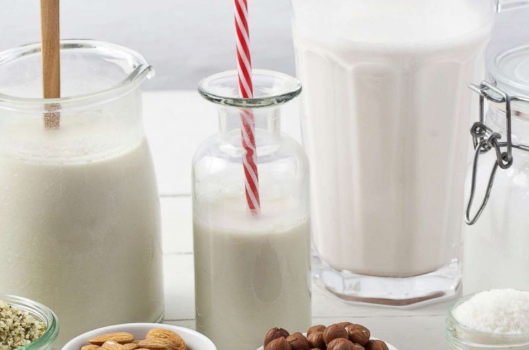
When it comes to milk, we all have our preferences. From childhood, milk is a staple in our diets, but with the rise of plant-based alternatives, it’s worth considering how these options compare to traditional dairy. As dietary preferences change and health concerns like lactose intolerance or milk allergies become more prevalent, plant-based milks have become increasingly popular. But are they a healthier choice? Let’s dive into the milk debate and explore which option is best for you.
How Do We Choose the Best Milk for Us?
Choosing the right milk largely depends on your personal health needs. If you have lactose intolerance or a milk protein allergy, plant-based milks may be a suitable alternative. It’s also important to consider your taste preferences as the variety of plant-based options, such as oat, almond, soy, coconut, and pea milks, offer different flavors and textures.
When comparing the nutritional values of different milk types per 100 ml:
- Whole Cow’s Milk: 66 kcal, 3.5g protein, 4.7g carbohydrates, 3.7g fat
- Almond Milk: 30 kcal, 0.9g protein, 1.5g carbohydrates, 2.1g fat
- Soy Milk: 41 kcal, 3.2g protein, 1.7g carbohydrates, 1.4g fat
- Oat Milk: 54 kcal, 1.6g protein, 6g carbohydrates, 2.1g fat
The protein content of soy milk is similar to that of cow’s milk, while oat milk contains the highest carbohydrate content. Plant-based milks are often fortified with essential nutrients like calcium, vitamin B12, and vitamin D, although organic plant milks may not be fortified. Cow’s milk, however, naturally contains important nutrients such as iodine and potassium.
Calcium: Essential for Bone Health
Calcium plays a crucial role in maintaining healthy bones and teeth, as well as supporting the nervous system and muscle function. Cow’s milk is a well-known source of calcium, offering around 120 mg per 100 ml. Plant-based milks, when fortified, can offer a similar amount of calcium, with almond milk being particularly high in this essential mineral.
Vitamin B12: Important for Brain and Nerve Function
Vitamin B12 is essential for red blood cell formation, nerve function, and the synthesis of neurotransmitters like dopamine and serotonin. A glass of cow’s milk provides about 46% of the recommended daily intake of vitamin B12 for adults. Fortified plant-based milks also contain B12, which is especially important for those following vegan or vegetarian diets.
Milk and Exercise: Which Is Better for Recovery?
Dairy milk is an excellent option for those who exercise regularly. It provides carbohydrates for energy before a workout and a balanced combination of protein, carbs, and electrolytes to aid in recovery afterward. The protein in milk helps repair muscle tissue post-exercise, making it a solid choice for athletes.
Environmental Impact: Which Is More Sustainable?
When considering the environmental impact of milk production, plant-based milks generally have a lower environmental footprint compared to cow’s milk. Here’s a breakdown of the environmental factors for both:
- Cow’s Milk: Requires 4 km² of land, 120 L of water per glass, and produces over 0.5 kg of greenhouse gas emissions.
- Plant-Based Milk: Requires just 0.25 km² of land, 5-70 L of water per glass, and generates 0.1-0.2 kg of greenhouse gas emissions.
While plant-based milks are better for the environment, they do tend to be more expensive than cow’s milk, which could be a consideration for some shoppers.
What to Look for When Buying Plant-Based Milks
If you’re opting for plant-based drinks, here are some things to keep in mind:
- Fortification: Ensure the milk is fortified with calcium, B vitamins (especially B12 and riboflavin), vitamin D, and iodine.
- High Content of Main Ingredient: Choose a product with a high proportion of its primary ingredient (e.g., almond or oat).
- No Added Sugar: Avoid plant milks with added sugars to keep your beverage healthy.
- Minimal Additives: Look for options free of thickeners, emulsifiers, stabilizers, or artificial flavorings.
Overall Thoughts: What’s the Best Choice?
The decision to switch to plant-based milk largely depends on your personal reasons. If environmental sustainability or animal welfare is a priority for you, reducing or eliminating dairy from your diet in favor of plant-based alternatives can be a great choice. However, if your goal is health-related, particularly for protein content, cow’s milk might still hold an edge in terms of nutrient density.
If you find plant-based milk to be more enjoyable than cow’s milk, there’s no harm in incorporating it into your diet. But if you’re not enjoying it, there’s no reason to force it—stick to what you like and feel good about. Keep in mind the environmental impact of your choices and try to balance your intake.
Finally, cost is an important factor. Cow’s milk is more affordable, so if you’re on a budget, this might be a more practical option. However, if the price difference is not a concern, plant-based milks offer a variety of flavors and nutritional benefits.
In conclusion, there isn’t a clear “best” type of milk. It’s a combination of your nutritional needs, ethical considerations, and taste preferences that will guide your choice. Whether you go for cow’s milk or a plant-based alternative, be sure to choose what works best for your lifestyle.










